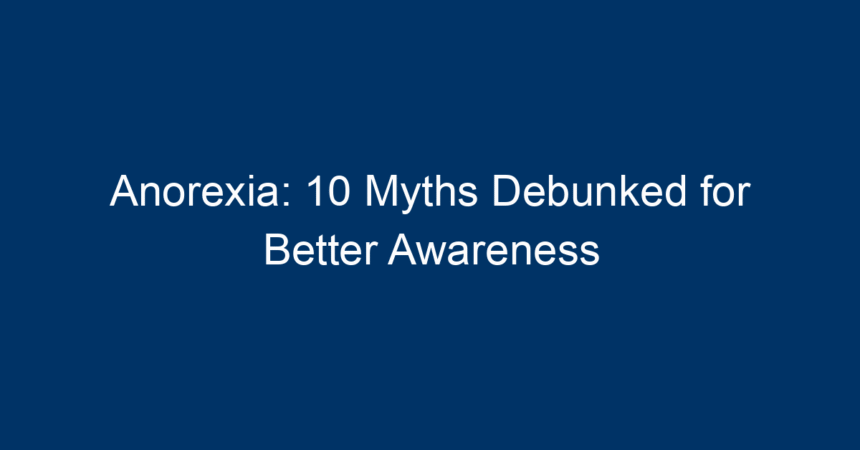Anorexia nervosa, commonly known simply as anorexia, is a complex eating disorder that affects millions of people worldwide. Despite its prevalence, there are numerous myths and misconceptions surrounding this condition that can hinder understanding and proper treatment. By debunking these myths, we can foster greater awareness and empathy, ultimately leading to better outcomes for individuals struggling with anorexia. In this article, we will explore ten common myths about anorexia, aiming to provide a clearer picture of this serious mental health issue.
Understanding Anorexia
Before diving into the myths, it’s crucial to understand what anorexia is. Anorexia is characterized by an intense fear of gaining weight, leading to restrictive eating habits, an irrational body image, and dangerously low body weight. While it often begins in adolescence, anorexia can affect individuals of all ages, genders, and backgrounds. It is essential to recognize that anorexia is not just about food; it often involves deep emotional and psychological challenges.
Myth 1: Anorexia Is Just a Phase
Many people believe that anorexia is merely a phase that individuals will eventually grow out of. However, this myth undermines the seriousness of the disorder. Anorexia is a severe mental health condition that can lead to significant physical health problems, including heart issues, bone density loss, and even death. Early intervention is crucial for recovery, and viewing anorexia as just a phase can delay seeking help.
Myth 2: Only Teen Girls Get Anorexia
While it’s true that anorexia often appears during adolescence, it is a misconception that only teen girls suffer from it. Anorexia can affect boys, older adults, and individuals from various backgrounds. In recent years, there has been a growing recognition of anorexia in males, challenging the stereotype that it is a female-only disorder. Awareness campaigns now emphasize that anyone can struggle with anorexia, regardless of age, gender, or background.
Myth 3: Anorexia Is About Vanity
Another widespread myth is that anorexia is simply about wanting to be thin or looking good. This oversimplification disregards the complex psychological underpinnings of the disorder. Those suffering from anorexia often experience profound emotional turmoil, low self-esteem, and a desire for control in their lives. It’s essential to understand that the motivations behind anorexia are multifaceted and often linked to underlying mental health issues.
Myth 4: People with Anorexia Can Just Eat More
A common misconception is that those with anorexia can simply eat more to recover. This misconception fails to recognize the psychological aspects of the disorder. Recovering from anorexia requires comprehensive treatment that includes psychological therapy, nutritional counseling, and medical monitoring. Simply telling someone to “eat more” can be dismissive and damaging. Recovery is a complex process that needs a supportive and understanding approach.
Myth 5: Anorexia Is a Choice
Some people believe that individuals with anorexia choose to starve themselves and that they can simply choose to stop. This perspective ignores the emotional and psychological distress involved. Anorexia is classified as a mental health disorder, characterized by profound anxiety and fear around food and weight. It is not a lifestyle choice but a serious condition that often requires professional intervention.
Myth 6: Weight Is the Only Indicator of Anorexia
It’s a widespread myth that you can only identify anorexia by looking at someone’s weight. While a low body weight is a common symptom, it is not the sole indicator. Many individuals with anorexia may maintain a “normal” weight while still obsessively restricting their food intake and battling body image issues. It’s essential to recognize that anorexia can manifest in various ways, making awareness of all its symptoms crucial for proper understanding and support.
Myth 7: Anorexia Only Affects Those Who Are Perfectionists
While perfectionism is often associated with anorexia, it is a myth to believe that all individuals with the disorder are perfectionists. Anorexia can affect people with various personality traits and backgrounds. Some might exhibit perfectionistic tendencies, while others may be more impulsive or struggle with anxiety. Understanding this variation is crucial in creating a supportive environment for recovery.
Myth 8: Anorexia Can’t Be Treated
There is a pervasive belief that anorexia is untreatable, leading to hopelessness for both individuals and their families. While recovery can be challenging and is not always linear, many people successfully overcome anorexia with the right support and treatment. Comprehensive treatment plans often include therapy, nutritional guidance, and medical care, leading many individuals to full recovery. It’s important to foster hope and encourage seeking help.
Myth 9: Anorexia Is About Food
While anorexia involves extreme dietary restrictions, saying it’s only about food is a significant oversimplification. Anorexia is often intertwined with emotional struggles, trauma, and mental health disorders, such as depression and anxiety. Addressing these underlying issues is essential for effective treatment and recovery. Recognizing that anorexia is a multifaceted disorder can help provide better support for those affected.
Myth 10: Talking About Anorexia Makes It Worse
Some individuals avoid discussing anorexia out of fear that it might exacerbate the issue. However, open dialogue about the disorder can foster understanding and reduce stigma. By talking about anorexia—its symptoms, challenges, and the importance of seeking help—we can create a supportive environment for those affected. Education and awareness are powerful tools in combating the myths that surround anorexia.
Conclusion: Breaking the Cycle of Misunderstanding
Anorexia is a serious and complex disorder affecting millions globally. By debunking these ten myths, we can foster better awareness and understanding of the challenges faced by those struggling with anorexia. It’s essential to approach the topic with empathy, recognizing that recovery is a multifaceted journey.
Actionable Insights
-
Educate Yourself: Understanding the nuances of anorexia can help create a supportive environment for those affected. Read reputable sources and participate in discussions.
-
Support Those in Need: If you know someone struggling with an eating disorder, offer your support and encourage them to seek professional help. Listening without judgment can make a significant difference.
-
Speak Out Against Myths: Challenge misconceptions about anorexia. Engage in conversations that promote awareness and understanding, helping to break the stigma.
- Seek Professional Help: If you or someone you know is struggling with anorexia, reach out to mental health professionals who specialize in eating disorders for assistance and guidance.
By challenging the myths surrounding anorexia, we can help pave the way for understanding, compassion, and effective treatment for those facing this daunting disorder. Together, we can work towards a future of awareness and support for all individuals impacted by anorexia.




